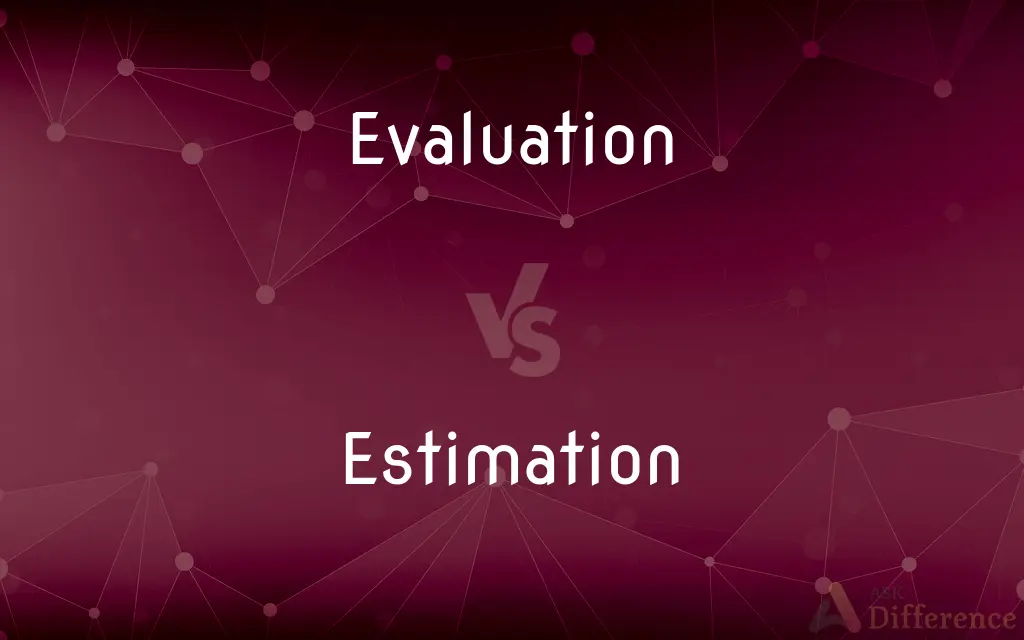Evaluation vs. Estimation — What's the Difference?
By Urooj Arif & Fiza Rafique — Updated on April 25, 2024
Evaluation involves assessing value or quality, often through detailed analysis and criteria, while estimation is about approximating a value, typically with some uncertainty.

Difference Between Evaluation and Estimation
Table of Contents
ADVERTISEMENT
Key Differences
Evaluation is a systematic process used to determine the merit, value, or worth of something based on set criteria and standards. On the other hand, estimation is a method used to make a rough calculation or educated guess of a number, size, or value without the need for precise data.
In evaluation, the focus is often on qualitative and quantitative analysis to support a conclusion or judgment. Whereas, estimation primarily relies on assumptions and prior experience to derive a close approximation.
Evaluations are commonly used in educational settings, employee performance reviews, and program assessments to make informed decisions. Estimations, on the other hand, are frequently employed in construction, budgeting, and time management to plan ahead without exact figures.
While evaluation typically results in a detailed report or feedback that highlights areas of improvement, strengths, and outcomes, estimation results in a numerical value or range, which serves as a guideline rather than a definitive answer.
Evaluations often require more time and resources because of their need for thoroughness and accuracy, while estimations are usually quicker and less resource-intensive due to their less detailed nature.
ADVERTISEMENT
Comparison Chart
Purpose
To assess value or quality using specific criteria
To approximate a value with some uncertainty
Data Requirement
Detailed data and analysis
Minimal data, relies on assumptions
Outcome
Detailed report, precise outcomes
Rough numerical value or range
Usage
Academic assessments, performance reviews
Budget forecasts, project planning
Time and Resource
Time-intensive and detailed
Less time-consuming, resource-efficient
Compare with Definitions
Evaluation
A systematic determination of a subject's merit.
Employee evaluations are conducted annually to assess performance.
Estimation
An opinion or judgment of the worth or character of someone.
Despite his quirks, his colleagues hold him in high estimation.
Evaluation
Critical appraisal to draw conclusions.
The film received positive evaluations from most critics.
Estimation
An approximate computation of size or time.
His estimation of the crowd's size was surprisingly accurate.
Evaluation
Assessment involving measuring to ascertain the significance.
His evaluation of the project's risks saved the company a lot of money.
Estimation
A rough calculation or judgment of the value, number, quantity, or extent of something.
The contractor made an estimation of the materials needed for the job.
Evaluation
The process of judging something's value or worth.
The evaluation of the new curriculum will be completed by the end of the semester.
Estimation
The forming of an opinion or conclusion about something.
Her estimation of the situation was that it would resolve without conflict.
Evaluation
Examination for the purpose of grading.
The final evaluation of the essays will decide the contest winner.
Estimation
A preliminary calculation made with incomplete data.
Their estimation of the project's cost was initially too low.
Evaluation
Evaluation is a systematic determination of a subject's merit, worth and significance, using criteria governed by a set of standards. It can assist an organization, program, design, project or any other intervention or initiative to assess any aim, realisable concept/proposal, or any alternative, to help in decision-making; or to ascertain the degree of achievement or value in regard to the aim and objectives and results of any such action that has been completed.
Estimation
Estimation (or estimating) is the process of finding an estimate, or approximation, which is a value that is usable for some purpose even if input data may be incomplete, uncertain, or unstable. The value is nonetheless usable because it is derived from the best information available.
Evaluation
The making of a judgement about the amount, number, or value of something; assessment
An initial evaluation of the programme
The evaluation of each method
Estimation
The act or an instance of estimating
Estimation of the storm damage took weeks.
Evaluation
To ascertain or fix the value or amount of
Evaluate the damage from the flood.
Estimation
The amount, extent, position, size, or value reached in an estimate
The cost estimation is $500.
Evaluation
To determine the importance, effectiveness, or worth of; assess
Evaluate teacher performance.
Estimation
An opinion or judgment
In my estimation, that is a good book.
Evaluation
(Mathematics) To calculate the numerical value of; express numerically.
Estimation
Favorable regard; esteem
Held her teacher in high estimation.
Evaluation
An assessment, such as an annual personnel performance review used as the basis for a salary increase or bonus, or a summary of a particular situation.
The result of the semestral evaluation will go towards your final score.
Estimation
The process of making an estimate.
According to my estimations, we should get to the border in five hours, give or take.
The publisher made an estimation on the potential value of the new novel.
Evaluation
(mathematics) A completion of a mathematical operation; a valuation.
Estimation
The amount, extent, position, size, or value reached in an estimate.
Evaluation
Determination of the value of a variable or expression.
Estimation
Esteem or favourable regard.
With that performance last night, you've gone up in the director's estimation.
Evaluation
Valuation; appraisement.
Estimation
The act of estimating.
Evaluation
Act of ascertaining or fixing the value or worth of
Estimation
An opinion or judgment of the worth, extent, or quantity of anything, formed without using precise data; valuation; as, estimations of distance, magnitude, amount, or moral qualities.
If he be poorer that thy estimation, then he shall present himself before the priest, and the priest, and the priest shall value him.
Evaluation
An appraisal of the value of something;
He set a high valuation on friendship
Estimation
Favorable opinion; esteem; regard; honor.
I shall have estimation among multitude, and honor with the elders.
Estimation
Supposition; conjecture.
I speak not this in estimation,As what I think might be, but what I know.
Estimation
An approximate calculation of quantity or degree or worth;
An estimate of what it would cost
A rough idea how long it would take
Estimation
A document appraising the value of something (as for insurance or taxation)
Estimation
The respect with which a person is held;
They had a high estimation of his ability
Estimation
A judgment of the qualities of something or somebody;
Many factors are involved in any estimate of human life
In my estimation the boy is innocent
Common Curiosities
What is the main difference between evaluation and estimation?
Evaluation assesses detailed value or quality, whereas estimation approximates values typically with uncertainty.
Why is evaluation important in education?
It helps in assessing students’ understanding and skills systematically.
How does estimation help in project management?
It allows managers to allocate resources and plan timelines based on approximate values.
What skills are necessary for making good estimations?
Experience, good judgment, and an understanding of historical data and trends.
Can evaluation and estimation be used interchangeably?
No, they serve different purposes; evaluation is for detailed assessment, while estimation is for making approximations.
Are estimations always rough?
Estimations are generally rough, but the degree of accuracy can vary based on the data and method used.
How do organizations use evaluations?
To improve processes, assess employee performance, and make strategic decisions.
What skills are necessary for effective evaluation?
Analytical skills, attention to detail, and a strong understanding of assessment criteria.
Are evaluations always accurate?
Evaluations aim to be as accurate as possible, but they can be subjective depending on the criteria and process used.
How do individuals use estimations in daily life?
For budgeting, planning travel time, and preparing for various needs without precise details.
Share Your Discovery

Previous Comparison
Grantor vs. Granter
Next Comparison
Season vs. ClimateAuthor Spotlight
Written by
Urooj ArifUrooj is a skilled content writer at Ask Difference, known for her exceptional ability to simplify complex topics into engaging and informative content. With a passion for research and a flair for clear, concise writing, she consistently delivers articles that resonate with our diverse audience.
Co-written by
Fiza RafiqueFiza Rafique is a skilled content writer at AskDifference.com, where she meticulously refines and enhances written pieces. Drawing from her vast editorial expertise, Fiza ensures clarity, accuracy, and precision in every article. Passionate about language, she continually seeks to elevate the quality of content for readers worldwide.














































